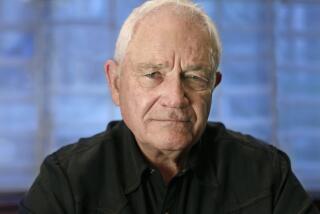Daniel Anker dies at 50; award-winning historical documentarian
Daniel Anker, an award-winning documentarian who used film to reexamine complex historical events, including Hollywood’s portrayal of the Holocaust and a life-saving sled-dog run in Alaska, died Monday in New York. He was 50.
The cause was pneumonia, a complication of his lymphoma, said his wife, Donna Santman.
Anker made more than a dozen films during a 25-year career, including “Imaginary Witness: Hollywood and the Holocaust” (2004), “Music from the Inside Out” (2004) and “Scottsboro, An American Tragedy” (2000), which earned an Emmy and was nominated for an Oscar.
His most recent film was “Icebound” (2012), which focuses on a famous story: the 700-mile sled dog relay that delivered serum to victims of a deadly diphtheria outbreak in Nome, Alaska, in 1925.
While previous chroniclers concentrated on the dog Balto (voiced by Kevin Bacon in a 1995 animated movie) and his Norwegian-born musher, Leonhard Seppala, Anker drew attention to other members of the heroic team, including native Alaskan mushers who played crucial roles in the relay. Part of the film re-creates the run along the original route and includes interviews with descendants of the team members as well as survivors of the outbreak.
He also sought to explain the backdrop for the dramatic event, exploring the political and racial angles that made the plight of white children in Nome headline news while earlier epidemics affecting mainly Alaskan natives went virtually unnoticed.
“It’s a small moment in history for which you can extrapolate all these larger truths about American culture,” Anker told the Associated Press in December when it opened the Anchorage International Film Festival.
For “Imaginary Witness: Hollywood and the Holocaust,” a critical analysis of Hollywood’s treatment of the Holocaust during World War II and later years, Anker examined rare newsreel footage of the death camps and more than 40 movies, including the 1942 Ernst Lubitsch comedy “To Be or Not to Be” and Sidney Lumet’s 1964 classic “The Pawnbroker.” He also unearthed a dramatic 1953 episode of the TV show “This Is Your Life” featuring Holocaust survivor Hanna Bloch Kohner.
Praised as a “devastating, impressively reflective documentary” by the New York Times, “Imaginary Witness” faulted American filmmakers for largely ignoring the Nazi slaughter of Jews during the war years and for downplaying it later.
“Scottsboro,” which was written and co-directed by Barak Goodman, also relied heavily on interviews and archival material to produce a nuanced portrait of the notorious racial drama in which nine African American teenagers were accused of raping two white women on an Alabama train in 1931.
The teenagers were convicted by an all-white jury and all but one were sentenced to death, but the verdict was overturned in a landmark 1932 decision by the United States Supreme Court, which concluded that the boys had received inadequate counsel.
“This was a story no one wanted to have told,” Goodman, who met Anker when both were undergraduates at Harvard University, said Friday. “Danny was the person who went down to Alabama … and coaxed people out of their silence and reticence. He had an openness and gentleness that really disarmed people.”
Anker was born in Washington on March 14, 1964. His mother, Charlotte, was a writer and his father, Jerry, was a labor lawyer.
He graduated from Harvard in 1986 with a degree in musicology and psychology and moved to New York, where he found work as a music associate on TV documentaries. He produced the popular PBS children’s series “Marsalis on Music,” which won a Peabody Award in 1995.
His most personal film was “Music from the Inside Out,” which explored the meaning and relevance of music through the eyes of members of the Philadelphia Orchestra.
Anker, who played piano and clarinet growing up, said the film was not really about musicians but “about all of us who enjoy music in any way, whether we sing in the shower or used to play as a kid,” he told the Washington Post in 2006.
He was finishing a film about Sidney Lumet when he died.
In addition to his wife and his mother, he is survived by a sister, Deborah, and two children.
More to Read
Start your day right
Sign up for Essential California for the L.A. Times biggest news, features and recommendations in your inbox six days a week.
You may occasionally receive promotional content from the Los Angeles Times.







